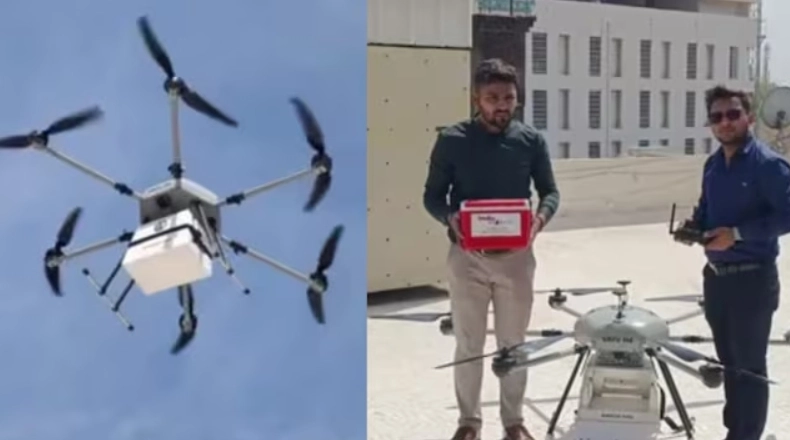
The introduction of ambulance services to provide medical care in remote areas was once seen as a ground-breaking development. However, a significant challenge remained: during accidents or childbirth, where there was substantial blood loss, delays in obtaining blood supplies were common. Today, drone technology has emerged as a game-changer, offering a solution for time-sensitive medical emergencies.
A free blood delivery service has been launched for patients within a 35 km radius, covering areas from Halol to Ghoghamba and Bodeli. Over the past three months, two drones have successfully delivered blood to eight patients in remote locations. These drones are capable of transporting up to six kilograms of blood, equivalent to eight units, at once. The blood can reach patients in just 20 to 25 minutes.
In the region around Vadodara, especially in tribal areas, there is a high incidence of sickle cell anaemia and general anaemia. This becomes particularly critical when women experience significant blood loss during childbirth. This drone delivery project, in partnership with Polycab India, aims to address these challenges.
The drones are provided by Battle Lab India, a Vadodara-based company, which also supplies drone pilots. The drones, valued at Rs 32 lakh, are designed for quick and efficient transportation. Currently, blood is delivered from a blood bank in Halol to Ghoghamba (22 km away) and Bodeli (35 km away) in emergencies. While similar drone-based blood delivery services were tested in Bangalore and Hyderabad, Halol is the first to offer regular, operational drone blood delivery in the country.
The drones are operated by specially trained pilots, who ensure the safe and timely delivery of blood. These pilots receive specialised training from a central government agency and certification from the Directorate General of Civil Aviation (DGCA). Currently, two types of drones are in use: a Hexa, which has six wings, and a Quad, with four wings.
The Hexa drone can travel up to 30 km while carrying four litres of blood, while the Quad can cover 14 km with a payload of two litres. Each Hexa drone can cover around 40 km using four batteries.
Blood is transported from one blood bank to another, where it is cross-matched with the patient’s blood type before being administered. In the future, the free drone blood delivery service will be expanded to additional areas, including Rajpipla and Alirajpur. This innovation in medical delivery promises to revolutionise healthcare logistics, particularly in remote areas and marks a new technological milestone in the medical field.
Gujarat is leading the way in this ground-breaking initiative, with Vadodara’s Indu Blood Bank pioneering the service of free blood delivery by drone, making it the first of its kind in the country.